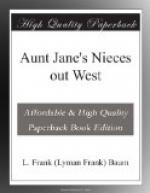He looked at her steadily now, again smiling.
“You’re not joking, Miss Doyle?”
“I’m in dead earnest.”
“Of course you realize this is the—the end?”
“Of your foolishness? I hope so. You used to eat like a sensible boy, didn’t you?”
“When I was well.”
“You’re well now. Your only need is sustaining, strengthening food. I came near ordering you a beefsteak, but I’ll reserve that for lunch.”
He sipped the chocolate.
“Yes; it needs more sugar,” he said quietly. “Will you please butter my toast? It seems to me such a breakfast is worth months of suffering. How delicious this egg is! It was the fragrance of the egg and toast that conquered me. That, and—”
“And one sensible, determined girl. Don’t look at me as if I were a murderess! I’m your best friend—a friend in need. And don’t choke down your food. Eat slowly. Fletcherize—chew your food, you know. I know you’re nearly famished, but you must gradually accustom yourself to a proper diet.”
He obeyed meekly. Patsy’s face was calm, but her heart beat fast, with a thrill of fear she could not repress. Acting on impulse, as she had, the girl now began to consider that she was personally responsible for whatever result might follow this radical treatment for dyspepsia. Had she been positive it was dyspepsia, she would never have dared interfere with a doctor’s orders; but she felt that the boy needed food and would die unless he had it. He might die from the effect of this unusual repast, in which case she would never forgive herself.
Meantime, the boy had cast aside all fear. He had protested, indeed, but his protests being overruled he accepted his food and its possible consequences with philosophic resignation and a growing satisfaction.
Patsy balked on the third slice of toast and took it away from him. She also denied him a second cup of chocolate. He leaned back in his chair with a sigh of content and said:
“Bless the hen that laid that egg! No dainty was ever more delicious. And now,” he added, rising, “let us go and inquire the address of a good undertaker. I have made my will, and I’d like to be cremated—it’s so much nicer than the old-fashioned burial, don’t you think?”
“I’ll attend to all that, if you wish,” she replied, trying to repress a shudder as she followed him from the room. “Do you smoke?”
“I used to, but the doctor forbade it; so I gave it up entirely.”
“Go over to that stand and buy a cigar. Then you may sit beside Beth and me and smoke it.”
The girl did not wholly approve of smoking and had often chided Uncle John and her father and Arthur Weldon for indulging in the habit; but this advice to young Jones was given in desperation, because all the men of her family stoutly affirmed that a cigar after a meal assisted digestion. She resumed her former seat beside Beth, and her cousin quickly read the anxiety on her face.




